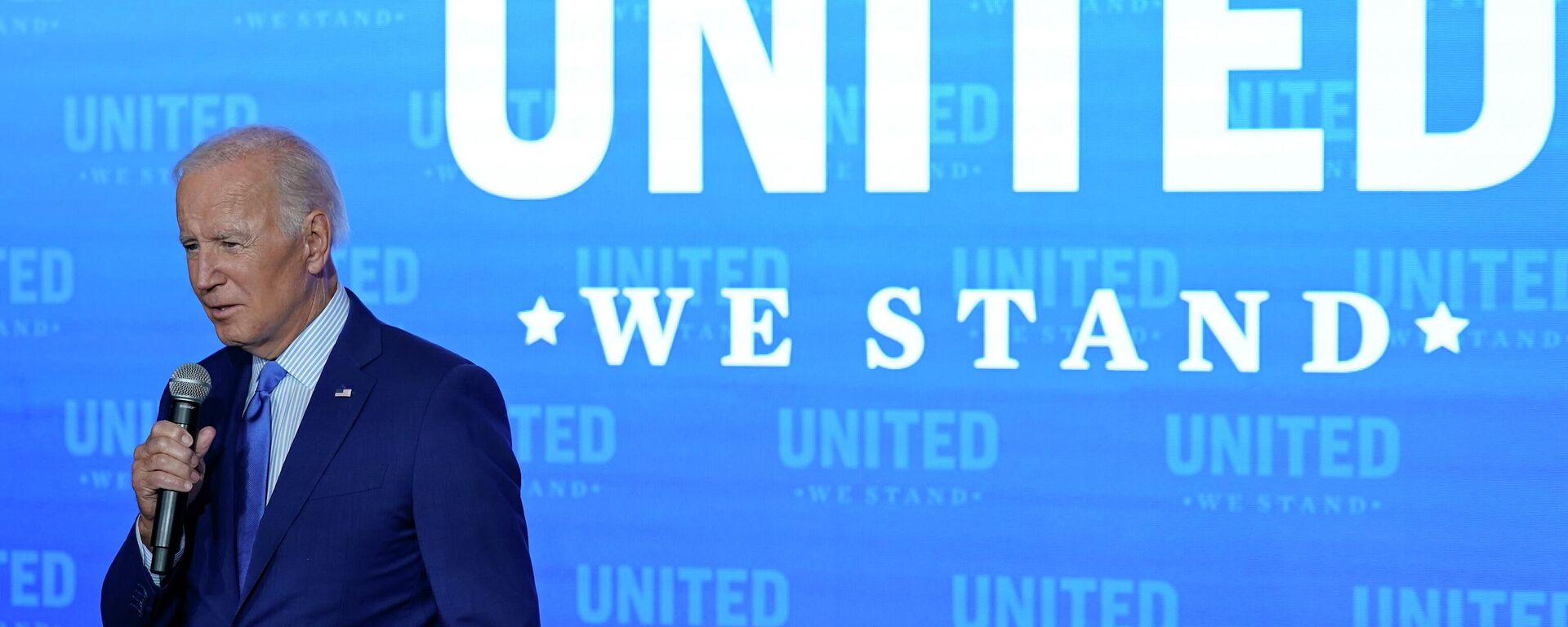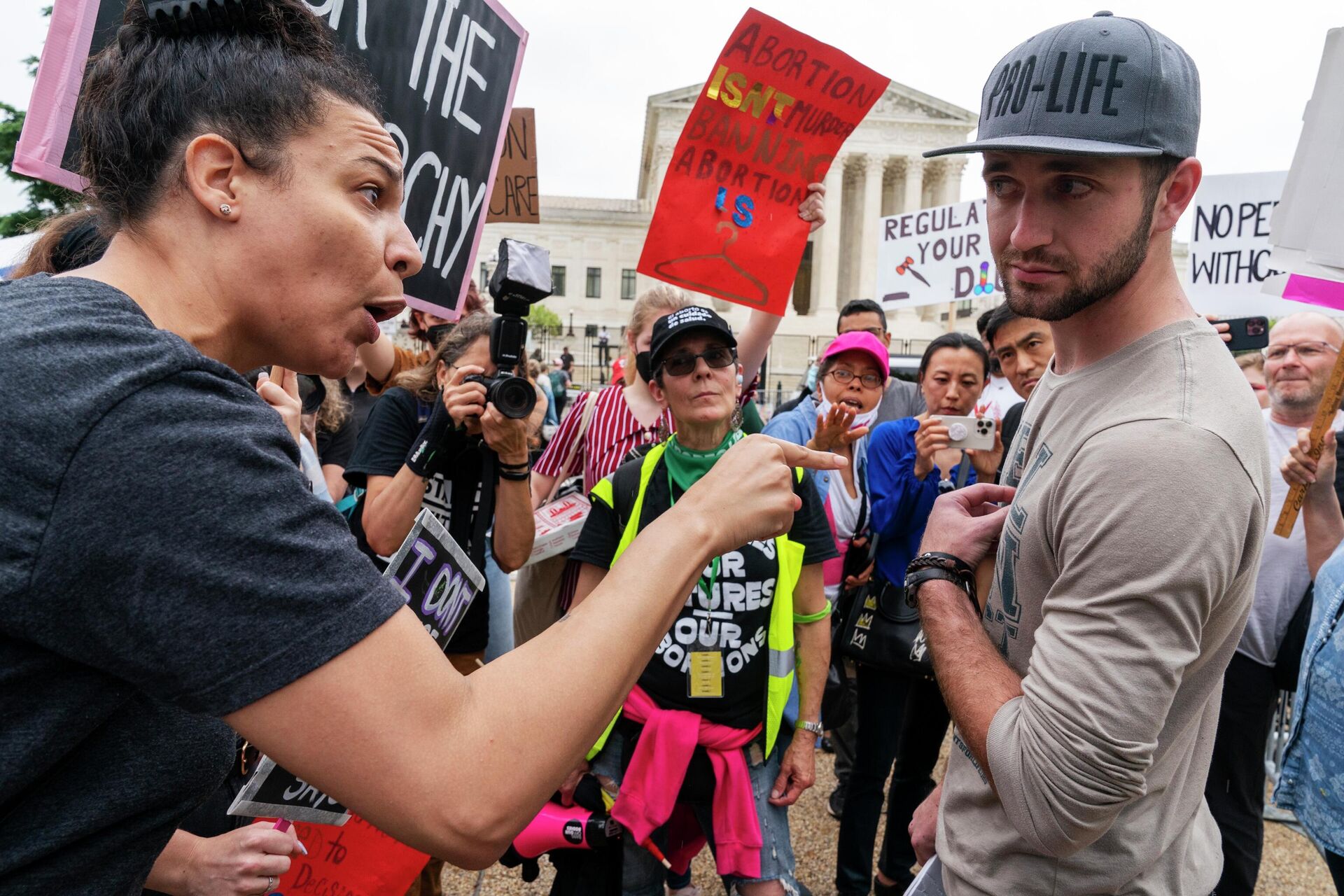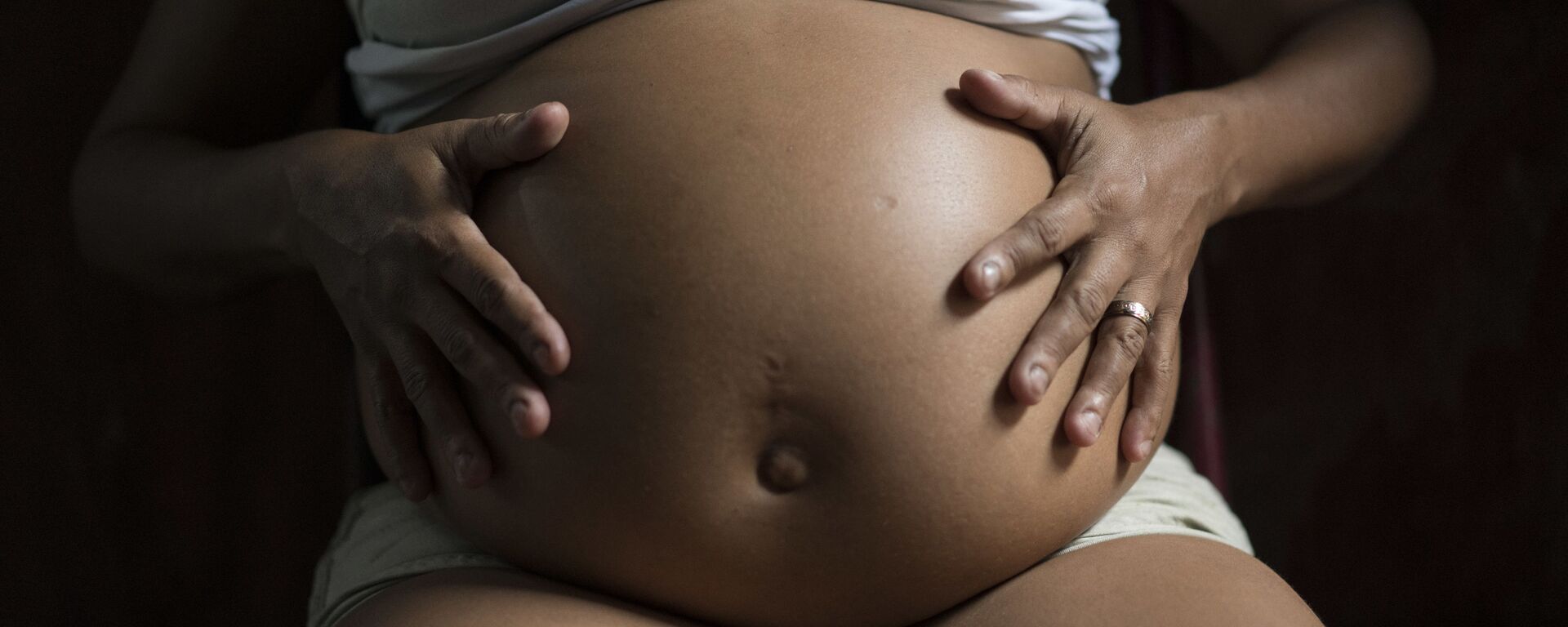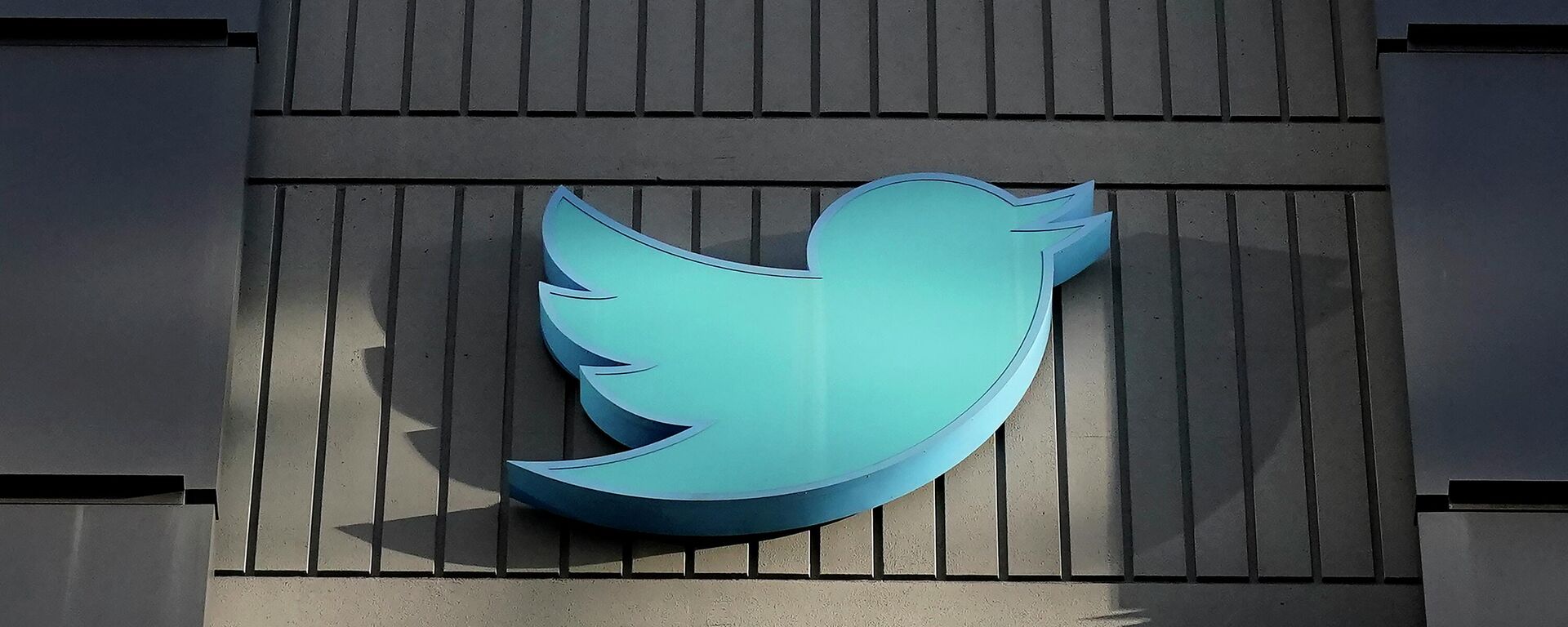COVID-19, Mass Shootings & Mar-a-Lago Raid: What Were the Top US Headlines in 2022?

© AP Photo / Matt Rourke
Subscribe
The past year has witnessed a shift in American politics on several fronts, including the striking down of a long-held federal right of women to seek an abortion, a raid by federal police on the former president’s estate, and the persistence of mass death by both illness and violence.
As the year 2022 draws to a close, let’s take a look back at some of its biggest stories in the United States.
Biden Declares Pandemic ‘Over’ as Omicron Persists
As the world ushered in the year 2022, it did so amid the worst-yet outbreak of COVID-19, driven by the Omicron variant of the virus, which was more capable than ever of dodging immune protections. January 4 saw more than 1 million new cases in the United States, and in May, the US officially passed 1 million COVID-19 deaths. The virus was clearly “here to stay,” as pundits put it.
In March, Pfizer began selling a new antiviral therapy against SARS-CoV-2, the virus that causes COVID-19, called Paxlovid. However, hopes that it would help end the pandemic were again dashed after it was revealed to have limited effectiveness, including a troublesome “rebound” infection several weeks later for some people - as US President Joe Biden discovered when he contracted the virus in July.

19 September 2022, 18:23 GMT
Biden declared in a September interview that the pandemic was “over,” although he acknowledged that SARS-CoV-2, the virus that causes COVID-19, was still “a problem.” However, health officials didn’t concur, especially the World Health Organization (WHO), which gave the official word about the outbreak becoming a pandemic. Biden’s administration also scaled back most pandemic-era aid programs, including mass testing, but extended the moratorium on student loan payments.
In September, Pfizer and Moderna rolled out modified “bivalent” booster shots that inoculated recipients against both the original SARS-CoV-2 virus and specifically the Omicron variant. However, like the prior vaccines, these too had limited preventative ability, and were presented as mostly useful for weakening the effects of the virus instead of blocking infection entirely.
Roe vs. Wade Overturned
While the US Supreme Court ruling that formally overturned the 1973 Roe vs. Wade decision didn’t come until late June, protests and outcry began in early May, thanks to an unprecedented leak of the draft majority decision of the court. The leak was denounced as a “grave betrayal of trust” and an investigation was made to find the source.
Meanwhile, demonstrators rallied in huge numbers outside the high court on Capitol Hill, but also upped the ante by marching to the homes of some of the six conservative justices.

Pro abortion rights demonstrators have a heated discussion with a man who is anti abortion, Saturday, May 14, 2022, outside the Supreme Court in Washington, during protests across the country
© AP Photo / Jacquelyn Martin
Called Dobbs vs. Jackson, the court’s June decision found that abortion access could not be guaranteed at the federal level by an action of the court, but only through legislation. As a result, numerous pre-Roe laws banning abortion immediately reactivated, and several states rushed to pass new restrictive bills. However, their efforts in several states failed, including Kansas, long seen as a conservative bastion, as well as in Kentucky and Michigan, among others.
However, the court’s decision also suggested that several other similar rulings could also be overturned in the future, including decisions that legalized interracial marriage, same-sex marriage, access to contraception, and the right to privacy. Democrats attempted to pass bills protecting these rights as well as abortion, but only succeeded at passing a truncated Respect for Marriage Act that protected aspects of same-gender and interracial marriages.
US Inflation/Recession Fears
Through the COVID-19 pandemic, the Federal Reserve chose to tolerate rising inflation out of a fear that attempting to clamp down on it by raising interest rates would damage the country’s recovery from the dramatic crash of March 2020, when global society ground to a halt amid the outbreak of the SARS-CoV-2 virus. However, by early 2022, inflation was reaching levels not seen in 40 years and the rising prices were beginning to have political consequences, so the central bank was obliged to take action.
Every month after March, the Fed raised interest rates, but inflation didn’t begin to slow its pace of increase until the late summer, and was still at elevated rates by the end of the year. Meanwhile, fears the US economy would “burn out” by the summer continued, and the US technically entered a recession, although a bizarre economic situation meant that job numbers were still increasing and wages remained high, even as the dollar continued to lose its value and the nation’s Gross Domestic Product stagnated.
As the year ended, virtually all economic predictions saw storm clouds on the horizon, and investors were bracing for the coming recession.
Mass Shootings
When this article went to publication, an unofficial tally had recorded 723 mass shootings in the United States in 2022, defined as the shooting of at least four people in a single incident, not counting the shooter. While the violence was heartbreaking, two incidents shocked the nation above all: the May 14 shooting at a grocery store in Buffalo, New York, that killed 10 people, most of them Black shoppers, and the May 24 shooting at an elementary school in Uvalde, Texas, that killed 22 people, most of them children.

Members of the Pharr, Texas, police department visit a memorial at Robb Elementary School to honor the victims killed in last week's school shooting, Thursday, June 2, 2022, in Uvalde, Texas.
© AP Photo / Eric Gay
The two incidents helped amplify calls for new gun control legislation, but also put the spotlight on the rising danger of white supremacist violence in Buffalo, and the hefty budgets given to police forces despite their refusal to take action. While some small measures were passed by lawmakers, a major gun control move eluded Democrats, as conservatives remained adamantly against further measures.
Elon Musk Buys Twitter
In April, billionaire industrialist Elon Musk reached a deal with Twitter’s board to buy the social media giant for $44 billion, rescuing it from a yearslong financial nightmare. However, Musk’s takeover was delayed until late October as he threatened to back out, accusing Twitter of withholding vital information from him about the platform.
After his takeover, Musk ushered in sweeping changes, not the least of which included firing or driving out roughly three-quarters of Twitter’s staff. Although he pledged to protect free speech on the platform and rescinded lifetime bans on a number of right-wing figures, Musk also drew criticism for banning comedy impersonations on the site as well as a number of left-wing journalists and accounts that were critical of him or reported on his actions.
Then in December, Musk flipped the tables yet again by turning over information to a group of journalists about how prior to his takeover, Twitter had worked to silence certain accounts and news topics, including with FBI guidance. The “Twitter Files” were both panned for what was seen by some as catering to right-wing narratives, as well as praised for peeling back the veil of social media policing of so-called “disinformation” in the wake of the Russiagate affair.
However, by December, Musk had seemingly had enough, and after a poll on his account showed that users wanted him to resign, Musk said he would step aside as soon as a new CEO “foolish enough to take the job” could be found.
‘Red Wave’ Fails to Materialize in Midterms
It’s a long-observed trend that the president’s party doesn’t perform as well in the midterm elections, held at the 2-year mark between presidential elections, as they did in the previous election. With the Democrats in control of the House, the Senate, and the White House, it was already expected they would lose one or both houses of Congress in the 2022 elections. Add to that Biden’s struggle for meaningful progress on his political agenda, and a growing economic crisis, and Republicans and Democrats alike predicted a “red wave” of conservative victories.
However, that’s not how things shaped up in the November vote.
While the Republicans did take back the US House of Representatives, they hold a narrow majority and are beset by internal disputes that threaten to block Rep. Kevin McCarthy (R-CA) from becoming House speaker.
In the Senate, Republicans failed to capture a majority, although because Sen. Kyrsten Sinema (I-AZ) left the Democrats to become the upper chamber’s third unaffiliated member, they technically have more seats than the Democrats do. However, all three Independents are far more likely to vote with the Democrats than the Republicans, giving liberals a de facto majority, if a razor-thin one.
Governors’ races were also a middling success for Republicans, although the sweeping victory of Florida Governor Ron DeSantis’ reelection campaign helped boost his popularity among Republicans, who afterwards favored him over former US President Donald Trump as their 2024 contender.
FBI Raids Mar-a-Lago
When Trump left the White House in January 2021, he took with him box after box of documents, many of which were supposed to be turned over to the US National Archives and Records Administration. However, as NARA and later the FBI learned, many of the files, taken to Trump’s Mar-a-Lago estate, were classified, with some rated as top secret.

An FBI photo of several classified documents found at Mar-a-Lago during an August 8, 2022, raid. Among them are files marked TOP SECRET/SCI, the highest known level of classification.
After a January request failed to result in Trump returning all the documents to the Archives, the Department of Justice dispatched investigators, which culminated in an FBI raid in early August that resulted in the seizure of hundreds of files.
While no charges have been pressed against Trump, the search and seizure warrant cited the 1917 Espionage Act, as well as federal statutes against mishandling of documents and obstruction of justice, as concerns justifying the raid.
A protracted legal battle has since ensued, with Trump claiming the raid was a “witch hunt” by a Democrat-controlled FBI that had long been out to destroy his presidency, and later his attempts to return to office. The scandal is one among many for Trump, which has helped to lower his standing among Republicans, even after he formally declared his presidential campaign in November.
Ketanji Brown Jackson Appointed to Supreme Court
In January, Associate Supreme Court Justice Stephen Breyer announced his intent to retire from the high court at the age of 83, having spent 27 years on the court. His imminent departure created a crisis, but also an opportunity for Biden to nominate his first justice to the nine-member court, which rules on the constitutionality of laws in cases appealed before it as well as actions by the Executive Branch and certain federal entities, such as ambassadors.

Judge Ketanji Brown Jackson takes the oath of office upon her appointment to the US Supreme Court on June 30, 2022.
© US Supreme Court
Breyer had been one of the court’s three remaining liberal justices, who became outnumbered by several conservative appointments under Trump, marking a sharp shift in the high court’s politics that led to the overturning of Roe vs. Wade, among other changes.
Biden nominated Ketanji Brown Jackson, a federal judge previously appointed to the position in 2012 by then-US President Barack Obama. A Black woman and former public defender, Jackson’s nomination earned the praise of civil rights groups, but she faced stiff opposition by conservatives in the US Senate, who grilled her on her supposed “radical left” politics, including her positions on abortion, gender identity, and the anti-racist school of historiography referred to by conservative politicos as “critical race theory.”
Despite the opposition, polls showed that 64% of Americans believed it was good for a Black woman to be appointed to the court, and several moderate Republican senators voted with their Democratic colleagues, approving her nomination. Jackson was sworn into office on June 30, 2022.





